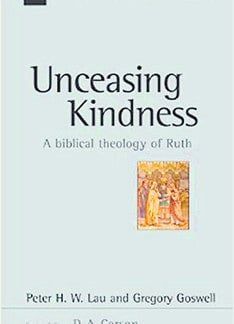What more could possibly be squeezed out of the well loved, much-studied-and-expounded book of Ruth? Well, Bible students, teachers and preachers of God’s Word will be interested and surprised at the content of this work.
It is not merely another commentary on Ruth. Although it builds on the close study of the text that others have done, it is in order to present a detailed treatment of the book’s themes from a theological perspective.
There are ten chapters, including an introduction and conclusion. The first half of the book considers how Ruth might have been read in the early post-exilic period. In the light of Ezra-Nehemiah, there would be a concern to keep the community free from foreign, pagan marriages and yet also proffer a welcome to proselytes.
A following chapter explores the ways in which the narrative in Ruth prefigures and parallels events in the history of David’s life. Following the Greek canonical tradition, Ruth appears in our Bible between Judges and Samuel. This presents the sharp contrast between the Bethlehem events at the end of Judges with those in Ruth. It also serves to reveal connections between Ruth and the character of Hannah, appearing at the beginning of 1 Samuel.
In Jewish tradition, Ruth is found either before Psalms or after Proverbs. Comparing Ruth and Proverbs — especially the ideal woman of Proverbs 31 — results in highlighting such themes as Ruth’s own praiseworthy character, divine providence and the practice of kindness.
Viewed in the light of the Psalter, Ruth appears as a model of piety, such as we find in ‘her illustrious royal descendant who composed many of the psalms’ (p.70).
The second half of the book tackles subjects as diverse as famine, God’s hiddenness and human agency, redemption and God’s mission. While these subjects are studied first in the context of the Ruth narrative, they are also explored throughout the whole biblical revelation.
For instance, Elimelech’s decision to leave the Promised Land is considered against the actions of the patriarchs and includes references to the New Testament’s response to famine situations. Spiritual famine and hunger are also addressed.
In surveying God’s hiddenness, care is taken to emphasise that this does not mean divine absence. It may have been helpful, though, to indicate that God’s presence is experienced in some places more than others (e.g. in heaven and in the earthly temple).
The authors deal with Jesus’ cry of dereliction from the cross with the statement that ‘God the Father was somehow separated from God the Son’ (p. 115). However, it would have been better to have added ‘in his humanity’ for the sake of clarification.
There has been a tendency to downplay Old Testament characters as merely examples to follow or warnings to avoid. The authors of this work are right to stress that biblical theology involves ethics as well as salvation history. They also have a helpful section on typology; good reasons are given as to why it is appropriate to see other Old Testament individuals like Boaz as types of Christ, in addition to those explicitly mentioned in the New Testament.
This is an academic work that interacts with scholars of all persuasions. There are plenty of footnotes and a sizeable bibliography for further study. A demanding read, but it will not disappoint those looking to further their appreciation of this most interesting book.
Philip H. Eveson
Wrexham









